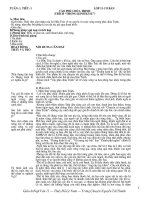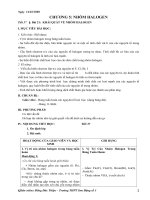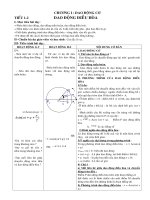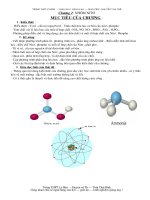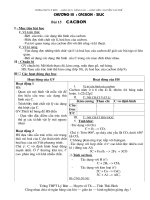Giáo án 11 cơ bản
Bạn đang xem bản rút gọn của tài liệu. Xem và tải ngay bản đầy đủ của tài liệu tại đây (173.41 KB, 40 trang )
Period 28 UNIT 6: COMPETITIONS
A. READING
I . Aims:
- To introduced some competitions to the pupils.
- To explain some key words: competition, stimulates to participate in, announce,
smoothly, organized by, apologized for…
- Vocabulary comprehensions: matching; passage comprehension and completing
the sentences bases on the reading passage
II. Teaching aids:
III/ Teaching procedures
A. Classroom procedures
A. Checking the previous lesson.
B. New lesson.
Time TEACHER S ACTIVITIES’ STUDENTS ACTIVITIES’
Before you read: Matching &
answering the questions
Answer key
a. Quiz “Road to Olympic
b. London Marathon
c. Sao Mai Television Singing
contest
d. Olympic Games
* Questions
(On the textbook, page 62)
While you read
a. Key words
- Competition
- Stimulate
- Announce
- Smoothly
- Organized by = which was
organized by …
- To participate in = to take part in
Apologized for = when you
complete
Task 1:
Match the words or phrases on the
left with their definitions on the
right
Answer key
1 2 3 4 5 6
d f e c b a
- work in pairs
- Match the words with the pictures
- Compare the answer with a partner
- Work in pairs
- Answer the questions
- Correct their pronunciation
- Read the text
- Explain the keywords
- Repeat the words
- Read the words
- Correct their pronunciation
1
Task 2: Answer the questions
1. The representatives of 3 classes
of the school…
2. It’s aim was to stimulate the
spirit of learning English among
students
3. The student’s parents society
sponsored the competition answer
the question
4. They had to complete 5 activities
in all. On competition of each
actions in the word sheets within 2
minutes
5. They had to observe and score
the student’s performance the …
group that got the highest score
would be the winner
The winner would be awarded set of
CDS for studying English and an
Oxford Advanced Learner's
Dictionary
Task 3: Read paragraph 3 again
and complete the sentences
1. …..To complete the poem
2. ….. The winner
3. .... 60 points
- Explain the words & phrases
- Pair works: one reads the words the
others reading its definitions
- Read the answers
Correct their pronunciations
Work in pairs
- Read the questions carefully
- Answer the questions
- Correct
Answer the question
- Write the answer on the board
- Correct
-Read again and compete them
-check the answers
Read the third paragraph again
Complete the sentences.
Period 29 UNIT 6: COMPETITIONS
B. SPEAKING
I/ Aims: to get Ss to:
-Ask for and give information about types of competitions
- talk about a recent competition or contest
II. Teaching aids:
III/ Teaching procedures
A. Classroom procedures
C. Checking the previous lesson.
D. New lesson.
Time TEACHER S ACTIVITIES’ STUDENTS ACTIVITIES’
Task 1
-Asks ss to work in pairs, ask and
answer the question from the table
on the book.
-Asks Ss to compare the answers
- work in pairs
- ask and answers
- Compare the answer with a partner
2
with a partner
-Asks Ss to give answers
-corrects the mistakes
Task 2
-asks Ss to work in pairs, ask your
partner how she / he feels about
each type of the competition/
contests in task 1
- asks Ss to look at the example on
the book and use language to
practice
-Asks Ss to give the meanings of
useful language on the book.
Asks Ss to ask and answers about
type of competition
-helps Ss if it’s necessary
-corrects the mistakes
Task 3
- asks Ss to work in groups of 4, talk
about a competition or contest you
have recently joined or seen.
- Asks Ss to use the suggestion from
the book.
- Asks Ss to give the meanings the
suggestions
- Asks Ss to talk about a competition
-Asks some groups to talk in front
of the class
- other groups to correct.
- corrects the mistakes
Home work:
-Learnt by heart the lesson
-Prepare the next part: C. listening
- give answers
- take notes
- work in pairs, ask some thing about
each type of the competitions
- translate the useful language into
Vietnamese
- ask and answers
- listen
- take notes
- work in groups of 4, and talk about
a competition or contest
- Using the suggestion from the book
-give the meanings
- talk about
- listen
- correct
- take notes
-listen
-take notes
Period 30: UNIT 6: COMPETITIONS
C. LISTENING
I. Aims:
- Listening to understand the Boston Marathon in the United States
- Listening & choosing true or false information
- Asking and answering about the content of the tape script
- Summarizing what they’ve just heard
II. Teaching aids:
- Text book, guidebook, tape script
3
- tape, cassette
III. Teaching procedures
A. Revision
B. checking the previous lesson
C. new lesson
Time TEACHER S ACTIVITIES’ STUDENTS ACTIVITIES’
Before you listen
Listen and repeat
- formally
- marathon
- athletic
- association
- emerge
- clock
- MC Dermott
- Kuscsik
While you listen
Task 1: Listen to the dialogue about
the Boston Marathon and decide
whether the statements are true or
false
Answer key
1 2 3 4 5
6
T T F F T
F
Task 2:
1. He come from New York
2. in 1972
3. 8 women
4. It’s about 26 miles or 42 km
Work in pair
- Discuss the given question on
the textbook
- Listen and repeat the words.
- explain the meaning of these
words
Repeat the words
- Read the statement carefully
- Decide whether they are true or
false correct & give the answer key
- Listen again
- answer the question
- write on the B/B
correct
Period 31: UNIT 6: COMPETITIONS
D. WRITING
I. Aims
- write A letter to ask for or give information
II. Teaching aids :
- Text book, guidebook, tape script
- tape, cassette
III. Teaching procedures
A. Revision
B. checking the previous lesson: formally, emerge, marathon, athletic .…
C. new lesson
4
Tim
e
TEACHER S ACTIVITIES’ STUDENTS ACTIVITIES’
Task 1
-asks Ss to work in pairs, complete the
letter, using the words in the box.
-asks Ss to give the meanings of the
words in the box.
-asks ss to read the information about
the English speaking Competition of
the letter
-asks Ss to complete the letter and
check the answers with a partner.
- Asks ss to give the answers
- corrects the mistakes and give
feedback:
1.website; 2. practicing; 3. native;
4.could; 5. provide; 6. hearing.
Task 2
-work in groups of 4, acknowledge the
letter from the book.
-asks Ss to respond to Thu Trang’s
letter, using the outline o the book.
-Asks Ss to read the out line carefully.
-explains and gives the meanings of
the out line
-goes round to help Ss
- asks Ss to write the letter on the
board
-corrects the mistakes
Home work
-Learnt by heart the lesson
-prepare the next part: E. LANGUAGE
FOCUS.
-Work in pair, complete the letter,
using the words in the box.
- give the meanings
- read the letter
- complete the letter
- check the answers
-give the answers
-listen
–take notes
-work in groups of 4,and to write
the letter using the out line on the
book
-respond to Thu trang’s letter.
-read
- listen to explain the out line from
the teacher.
- Write the letter.
- Compare with partner.
- Write on the board
- Take notes
- listen
- take notes
Period 32: UNIT 6: COMPETITIONS
E. LANGUAGE FOCUS
I. Aims:
- Pronounce correctly /tr/ , /dr/, and /tw/
- Reported speech with gerund
II. Teaching aids
- Textbook, work book
5
- guide book
I. Teaching procedures
A. Revision
B. Checking the previous lesson.
C. new lesson
Time TEACHER S ACTIVITIES’ STUDENTS ACTIVITIES’
Pronunciation
1. Listen and repeat
2. Practice reading these sentences
Grammar: Reported speech with
gerund
Exercise 1: Pair works – Discuss to
change some sentences into reported
speech
* Answer key
1 .. Thanked me for helping… ………
2 congratulated me on passing ..… …
3…. apologized for not phoning (on
driving)
4…. accused the boy of not paying…
5. Insisted on driving…
6. dreamed of being rich
7. Warned Ann against staying…
8. Prevent Jane from going…
9. Denied borrowing…
10. Thank Jack for visiting ..…
- Read the words once or twice.
pay attentions to the word having
consonant /tr/, /dr/, and /tw/
- Repeat each of the words
- One by one read the words again
and correct their pronunciation
- Read these sentences once
- Pair works: practice reading these
sentences
- Find the words having the
consonants /tr/, /dr/ and /tw/
- Correct their pronunciations
- Work in pairs
- Discuss the answer
- read the answers
- write on the B/B
correct
Exercise 2: Rewrite the dialogues in
reported speech, using the verbs in the
box
- Pair works: Discuss and give the
answers as the following example
Ex: Come in Peter!
I’m sorry I’m late
-> Peter apologized for being late
* Answer key.
2. … looked forward to meeting their
children s«n.
3. … denied breaking the window of
- Read the dialogue
- Change into)
- Complete the dialogue by using
reported speech
- Practice reading the dialogue
- Correct
6
the woman’s house.
4. … insisted on paying for the meal.
5. …stopped the customer leaving the
stop
6. … admitted stealing Mrs. Brown’s
car.
7. … suggested having a party.
8. … were thinking of buying the
house
D. Homework: Change into reported
speech
1. I’ll drive you to the airport. I insist
John said to Linda
2. Don’t play with the matches! I said
to Jack
3. I’m sorry I didn’t phone you earlier
Mary said to you.
Period 33: TEST YOURSELF B
I. Aims:
- To check 4 ss' skills: listening, reading, writing and using structures.
- To summarize the content they’ve learnt in units 4, 5 and 6.
II. Teaching aids:
- Tape, cassette.
- Textbook, workbook.
- Guide book.
II. Teaching procedures:
A. Listening: Listen and decide true / false statements
Answer key
1. T
2. F
3. T
4. T
5. T
Read the statements carefully and
guess the topic you are going to hear.
Listen to the typescript twice
- Pair works: discuss the answers-
Read the answers
- correct
- Listen again to check the answers.
B. Reading: Read the passage and answer the questions
1. MSF means “Doctor without
Borders”
2. to help people who have suffered
badly in wars or natural disasters
3. about 3000 volunteers
4. They have to able to deal with stress
- Read the passage
- explain some words
- pair works: discuss and find the
answers
- pair works: Ask & answers the
questions
7
and to work independently as well as
in a team.
5. The most rewarding thing was
learning how people in other cultures
live and think.
- correct their answer
C. Grammar.
1. Talking 2. To go 3. smoking
4. Saying 5. Do 6. going
7. Watching 8. To meet 9. to be
10. making
- Pair works: Discuss the answers
- read the answers
- Give the remarks.
D. Writing: Write about me of the competitions for secondary students on TV.
- Group works: Discuss the give guidelines
- Each group writes an essay
- The represent of each group reads the essay of his group
- Correct their mistakes and guide them to give mark
Period 34 TEST 45’
I. Aims:
To check 4 skills: Listening, reading, writing and using structures
To review the content of 3 units: 4, 5, and 6
II. Contents
Period 35 TRA VAØ SÖÕA BAØI KIE M TRA 45’Û Å
Period 36 UNIT 7: WORLD POPULATION
A. READING
I. Aims:
- Read and guess the meaning of the words
- Read and answer the questions
- Read and summarize the content of the reading
II. Teaching aids
- Tape, cassette
- Textbook, dictionary.
III. Teaching procedures
A. Revision
B. Checking the previous lesson.
C. New lesson.
TIME TEACHER S ACTIVITIES’ STUDENTS ACTIVITIES’
* Before you read
Pair works: Look at the pictures
carefully and answer the questions
The answers are varied Ps can
explain that “the larger in
Pair works. Look at the pictures
-answer the questions.
8
population a country is, the stronger
it is”
* While you read
a. Keywords:
+ figure
+ repeatedly
+ birth – control method
+ overpopulation
+ limit
+ probably
+ increase
Task 1: Fill each blank with a
suitable word from the box.
Answer key
1. although
2. method
3. increase
4. resources
5. figures
6. limit
7. international
8. control
Task 2: Answer the questions on
the passage
Answer key.
1. The population, in 10 000 BC
was 10 million, in 1750 it
was 625 million, in 1850 it
was 1300 million, in 1985 it
was 4760 million, in 2000 it
was 6.6 billion.
2. By the year 2010, the
population of the world is
expected to be 7 billion
3. some scientist say it can, but
others say it can’t
4. no they don’t
5. B/c they know of no safe
way to have fewer children
• After you read.
Answer key
a. Five words largest countries in
population: China, India, Russia,
the USA & Indonesia.
b. The position of these countries
- China, India and Indonesia are in
-listen to explain
- Read the passage
- explain the meaning of some
words
- repeat the words
- read the words
- Correct their mistakes
- Read the passage silently
- Read each uncompleted sentences
and choose the best answer for
each sentence.
- Explain the meaning of the words
in the box.
- read their answer
Correct.
Pair works:
- Read the questions
- Discuss the answers after reread
the passage
- Go around the class to help them
if necessary
- read the answers
- correct
-ask ss to read the passage again
-work in pairs, ask and answer the
questions from the book
-ss to check the answers
-ss to give answers
-correct the mistakes
-take note
9
Asia
- Russia is in Europe
- The USA is in Latin America
c. The richest country is the USA
the poorest country may be India
Home work:
- Read the passage again – pay
attention pronounce correctly
- learnt by heart the key words
- Prepare the next part.
-read the passage again
-learnt
-take notes
Periods 37: UNIT 7: WORLD POPULATION
B- SPEAKING
I. Aims:
- Discuss and talk about the reason of over population of our country and of the
world
- Discuss and talk about the differences of some overpopulated countries
- Work out some solutions to the problems of overpopulation
II. Teaching aids:
- Text book, guide book.
III. Teaching procedures
A. Revision.
B. Checking the previous lesson.
C. New lesson.
Tim
e
TEACHER S ACTIVITIES’ STUDENTS ACTIVITIES’
Task 1
Work in pairs: Below are some causes to
population explosion. Put them in order
of importance and explain why
- ask ss to explain the reason why
- goes around to help them if it’s
necessary
- asks The leader of each pairs presents
their results and explains.
-corrects and explains carefully
Task 2:
-ask ss to work in pairs. Look at the list
the problems facing poor and
overpopulated countries.
-ask ss to discuss and list the problems
facing poor and over populated
countries by using some useful language
-work in pairs. The causes on the
text book, page 75 Discuss and
arrange the causes to population
explosion in order of importance
-give answers and explain
-listen
-take notes
-work in pairs. Look at the list the
problems and overpopulated
countries
-discuss and report the results by
using some useful language.
10
on page 76.
Ex: Poor living condition
Low living standard
The leader of each pairs lists their
problems
-Corrects their answer
Task 3:
Work in groups of 4, discuss and work
out the solution to the problems of
overpopulation using the useful
language on the textbook
-goes round to help ss if it’s necessary
-corrects the mistakes.
Task 4:
-ask ss to work in groups of 4, talk
about the problems of overpopulation
and offer solutions, using the results of
tasks 2 and 3
the leader of each groups reports to the
class
Gives remark.
Home work:
-ask ss to do home work
- learnt by heart the lesson
-prepare the next part:
C. LISTENING
-look at the model example
-the leader of each pair to report in
front of the class.
-take notes
-work I groups of 4 and discuss .
-using some useful language on
the book.
-talk about
- listen and takes
-work in groups of 4, talk about the
problems
-discuss and give answers
-the leader of each groups report to
the class.
-listen
-take notes
Period 38 UNIT 7: WORLD POPULATION
C- LISTENING
11
I. Aims:
- Listen and choose the best answer A, B, C or D for the statements.
- Listen and answer the questions.
- Listen and summaries the main idea of the passage
II. Teaching aids:
- Textbook, guidebook.
- tape script
- Cassette, tape.
III. Teaching procedures
A. Classroom procedures
B. checking the previous lesson
C. new lesson
Time TEACHER S ACTIVITIES’ STUDENTS ACTIVITIES’
Before you listen
- ask ss to work in pairs, ask and
answer the questions on the book.
1. Do you think that our world
overpopulated?
2. What continent has the largest
population?
+ Listen and repeat
( The words and phrases on the
textbook, page 76)
• While you listen
Task 1:
-asks ss to choose the best answer A,
B, C & D for the following statements
-asks ss to read the statements
carefully before you listen
-asks ss to give the meanings of the
statements
-asks ss to listen and correct the
answers
-asks ss to check the answer with a
partner and give answers
-corrects the mistakes
Task 2:
Listen again and answer the
questions
Answer key
1.… is/will be over 7 billion
2 … the population growth rates in
some parts of the world are not the
some. The pop grows more quickly in
some part of the world then others.
3. … is the improvement of public
-Work in pairs
ask and answer the give questions
-Read the words and phrases once
-explain the meaning of the words
and phrases
-repeat the and phrases
repeat the words & phrases
- Read the statements carefully
-give the meanings of the
statements
- Listen to the tapescrip once or
twice
- Decide which is the best answer
- Listen again & check
- Read the tapescript twice
- Listen carefully and answer the
question
- Discuss the answers they’ve Just
heart.
12
health services & medical care
4. … shortage of food, lack of
hospitals & schools, illiteracy & poor
living conditions
5. … to educate people and make
them answer of the danger of having
more children to provide safe
inexpensive birth control methods, to
strictly implement a family planning
policy & to exercise strict and far
reward & punishment policies
* After you listen: Summaries the
main ideas of the passage
1. How many questions did the
interview ask?
2. What is the interview about
3. What did the expert say about the
population of the world, the causes of
population explosion, the problems it
causes to the world, particularly to
developing countries, and the
solutions to the problems?
Homework:
- Learnt by heart the information
you’ve heard
- Prepare the next part writing
Work in groups
1. Discuss and summarise the main
ideas of the interview
2. you can are answer the
following questions
3. the leader of each group writes
the answers of his group and
reports to the class
listen and give the remark
-listen
-take notes
Period 39 UNIT 7: WORLD POPULATION
D- WRITING
I. Aims:
- Write an essay describing the information in the chart about the distributions of the
world population by region
- Interpreter static’s on population on charts
II. Teaching aids:
A. Revision
B. checking the previous lesson
C. New lesson.
13
Activity 1: Ask and answer the questions about the information on the chart
1. What is the population of Latin America?
2. Compare the rate of population of Accent with the one of Africa?
Activity 2: Ask them to look at the information in useful language
It can seen that
distributed unevenly
Account for … per cent
More than/double the population of
Half as much as/ nearly half aft
-rank first/last
Activity 3: Write a paragraph from the give words and phrases
The chart/show/distribution/world population/region/it/ seen that/ rates of population
not/ same/ different parts/ world. Population distributed unevenly/ indeed, south
Asia/ population/ account/ 32%/ This region/ rank/ fist/. East Asia/ population/
account/ 26%. Population rate/ Europe/ 15%/ it/ really half/ population/ South Asia
Africa/ population rate/ 11%/ but/ northern America/ figure/ only 6%/ we/ see that/
population/ Africa/ nearly double/ population/ account/ 8%, but/ Ocean/ only/
account/ 2%/ population/ world. IT/ rank/ last.
Activity 4:
Read the complete paragraph
Remark & correct of its necessary.
Period 40 UNIT 7: WORLD POPULATION
E. LANGUAGE FOCUS
I. Aims:
- Pronounce the consonants /kl/, /gl/, /kr/ &/kw/
Correctly
- Review conditional type 1, 2, 3
- study conditional in reported speech
II. Teaching aids:
- Textbook, guidebook, work book.
- some more exercises
III. Teaching procedures
1. Revision
2. Checking the previous lesson
3. New lesson.
Time TEACHER S ACTIVITIES’ STUDENTS ACTIVITIES’
14
Pronunciation
a. Listen and repeat
The words on the textbook, page 79
b. Practice reading these sentences
(The sentences on the textbook,
page
2.Grammar
Revision: Talking about conditional
type 1, 2, 3
Read the words once pay attention to
the differences between the
consonants /kl/, gl/, / gr/, and /kw/
read clearly each word repeat
read the words
correct their pronunciation
read the sentences once
practice reading
find the words having the consonants
Type If clause Main clause
I Simple present Simple future
II Past subjunctive
Be: were
V: II/ed
Would/could + bare inf
III Past perfect
(had +PP)
Would/could + have +P.P
b. Conditional in reported speech
Direct speech indirect
Type 1 type 2
Type 2 Type 2
Type 3 Type 3
* Exercise 1:
Answer key
3. World drive 6. will take
4. Would you like 7. closed
5. is 8. will come
* Exercise 2
Answer key
2. had known 5, wouldn’t
3. had been told have been
4. Had realized 6. would have bought
Exercise 3: Change the following
conditional sentences into reported speech
Answer key
2. …. he would come to see her if he
had…
3. What she would say if SO stepped on
her…
4. … if it didn’t rain, they would….me…
5. …what she would do if she were…
Work in pairs
Discuss the condition type 3.
work out the answers
Correct & remark.
Work in pairs
Read the conditions sentences carefully
change into reported speech
read the answers
15
6. … If I had asked him he would have lent
me his motorbike
7. … they would be very disappointed if she
didn’t come.
8. … he was sure they would understand if
she explained the situation to them
D. Home work:
- Study/learn by heart the new structures
- Do exercise on the work book.
correct
-listen
-take notes
16
